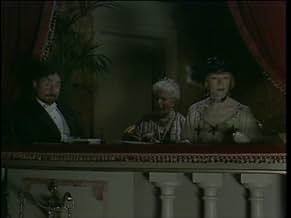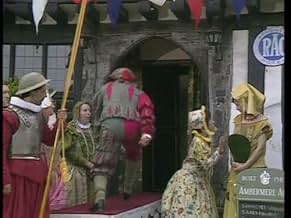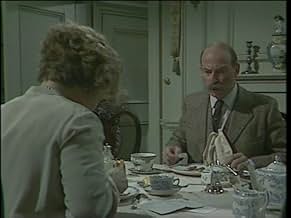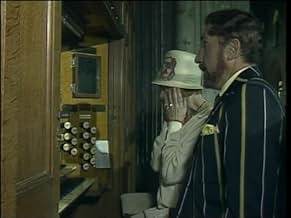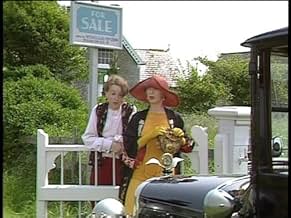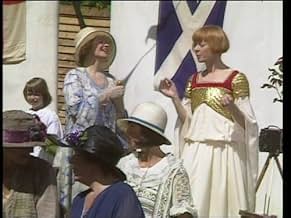The social rivalry between two women in the 1930s when Lucia moves to the small English town of Tilling.The social rivalry between two women in the 1930s when Lucia moves to the small English town of Tilling.The social rivalry between two women in the 1930s when Lucia moves to the small English town of Tilling.
- Nominated for 1 BAFTA Award
- 1 nomination total
Browse episodes
Featured reviews
The Best Thing Ever.
This is really a wonderful series about the battles and escapades of the 1930s British upper middle class. Follow the humorous escapades of Miss Elizabeth Mapp and Mrs. Emmeline ("Lucia") Lucas as they strive to become the social queen of Tilling's society. Based on the original stories by E.F. Benson, Mapp & Lucia will not leave you disappointed. If you haven't seen Mapp & Lucia yet, you will never know what you are missing.
A wonderful show for anybody wanting a good laugh, required viewing for any British drama fan.
10 stars.
This is really a wonderful series about the battles and escapades of the 1930s British upper middle class. Follow the humorous escapades of Miss Elizabeth Mapp and Mrs. Emmeline ("Lucia") Lucas as they strive to become the social queen of Tilling's society. Based on the original stories by E.F. Benson, Mapp & Lucia will not leave you disappointed. If you haven't seen Mapp & Lucia yet, you will never know what you are missing.
A wonderful show for anybody wanting a good laugh, required viewing for any British drama fan.
10 stars.
What a delightful portrayal of Mr. Brenson's works! One wishes that his entire series of books had been included; it would have been a plethora of riches indeed! Having recently had the great pleasure visiting Rye, It is now possible to immerse myself all the more completely into these tales! (Beautiful country, by the way!)
This was first shown on Channel 4 here in the UK in about 1985, I don't know if it was ever repeated. I missed it then and it wasn't until I read the books several years later that I started to look out for it. I recently got the entire series on video (would have been better on DVD) and it is a hoot.
The main characters were just as I pictured then and the casting was spot on. Geraldine McEwen (not yet a Dame alas, apropos a previous comment) and Nigel Hawthorne (who is indeed Sir Nigel) shine as Lucia and Georgie but perhaps they had easier characters to portray and it is Prunella Scales as Mapp who give the best and most difficult characterisation, though all the parts are really caricatures. Everyone must have had such fun making this and Lucia's costumes are something to behold.
The exteriors are mostly Rye in Sussex, where the author E.F. Benson lived (and was the Mayor). Lucia he probably based on himself, which begs the question who was Georgie in real life?!. You can go to the house he lived in which was clearly Mallards in the books and is now National Trust property. Henry James lived there before him. However, it wasn't used as the exterior here.
Some characters from the books are dropped in the series, the Padre's wife and the Wyses's daughter, but you don't miss them. Traces of McEewen's power mad and devious Lucia can be seen in her portrayal of the mad religous mother in 'Oranges are not the Only Fruit' (1990).
Sip tea and cakes with friends on a wet Sunday afternoon as you watch this - it'll cheer you up no end.
The main characters were just as I pictured then and the casting was spot on. Geraldine McEwen (not yet a Dame alas, apropos a previous comment) and Nigel Hawthorne (who is indeed Sir Nigel) shine as Lucia and Georgie but perhaps they had easier characters to portray and it is Prunella Scales as Mapp who give the best and most difficult characterisation, though all the parts are really caricatures. Everyone must have had such fun making this and Lucia's costumes are something to behold.
The exteriors are mostly Rye in Sussex, where the author E.F. Benson lived (and was the Mayor). Lucia he probably based on himself, which begs the question who was Georgie in real life?!. You can go to the house he lived in which was clearly Mallards in the books and is now National Trust property. Henry James lived there before him. However, it wasn't used as the exterior here.
Some characters from the books are dropped in the series, the Padre's wife and the Wyses's daughter, but you don't miss them. Traces of McEewen's power mad and devious Lucia can be seen in her portrayal of the mad religous mother in 'Oranges are not the Only Fruit' (1990).
Sip tea and cakes with friends on a wet Sunday afternoon as you watch this - it'll cheer you up no end.
People seem to be trying to analyse this series to death, at the end of the day it is simply a wonderful comedy of manners, wonderfully acted and beautifully presented. The principles are all actors of great experience and charisma, working with almost infallible material. If you want slapstick or alternative humour, this is not the place for you! If you love watching a comedy where it is the actors who make the script brilliantly funny, rather than simply being given punchlines to deliver, then you should be in seventh heaven. Watch, relax, enjoy.
The 1980s was a Golden Age of TV costume drama, with 'Brideshead Revisited' and 'The Jewel in the Crown' watched by millions and passing into legend. The fetishistic fidelity of these works (well over 10 hours long, with seemingly every word of the source novels) betrayed an ideological function - the invocation of a past which, even if traumatic and disruptive, was coherent, linked to tradition (national, literary, class etc.), where Oxbridge and the Empire are central even as they are in decline (e.g. 'Jewel' was all about the fall of the Raj, rather than the foundation of the new Indian state). It is a celebration of a certain traditional conservatism, while present-tense conservatism (Thatcherism) was actively dismantling those traditions. The notion of fidelity to text created a hierarchy - the novel and the author are sacred and must be translated as exactly as possible - that seems hostile to change, multiple interpretations, different voices.
Parallel to this ransacking of high(ish) culture, however, were classic adaptations of what might be called 'light' literature, e.g. 'The Irish R.M.' Whereas fidelity to the source in the above-mentioned cases led to dramatic inertia, these other programmes have dated much better - because there is no fear of misinterpreting a 'great' or 'serious' author, there is a greater freedom with the source, a willingness to restructure it if necessary to provide narrative coherence and - wonders - entertainment. As a result, 'light' literature produces genuinely classic television, one that isn't content to simply replicate the past, but has pertinent things to say about the present.
Take the largely under-rated 'Mapp and Lucia', for instance. Not only does its heroine, like Thatcher, have red hair, often speak in an affectedly deep voice, and, under the guise of respecting conservative hierarchies, radically shake up a deeply conservative English social structure, eventually becoming mayor; but the plots touch on pertinent issues such as elections, charity and government subsidies, and the notion of what it means to be English, and what constitutes tradition.
Further, unlike 'Brideshead' or 'Jewel', it foregrounds its status as a costume/period/heritage drama, not just making a mockery of the genre's traditional pleasures - dialogue, costumes etc. - but in containing within itself its own costume/period/heritage reconstructions (the Queen Bess pageant; the historical tableaux) that are both inherently ridiculous and call into question the functions of such recreations, especially in the 1980s. Further, it uses the elitist assumptions of the genre - that is is literary, more cultured and civilised, more mannerly than violent action movies, say - to relate a series of stories where class, art and manners are used as weopons for truly vicious, shocking ends.
'Mapp and Lucia' never pretends to be a faithful historical reconstruction. It exults in its own artifice, the mannered affectation of the characters matched in the art deco stylising, the artificial decor and the crazy outfits. The effect is of a musical comedy, so exquisitely stylised that it sometimes achieves the pitch of Wilde in 'The Importance of Being Earnest', where the choreography of the characters and their gestures, the artifice of the surroundings, the composition of the image and the delivery of the dialogue create a kind of visual rhythm as music. This is especially apparent in the second series, where greater attention is paid to composition and the effects achievable by music (e.g. the cow-like accompaniment to Mapp's bovine tread).
The characters are never caricatures - they are real people playing caricatures in a bizarrely surreal vision of what constitutes a conservative English village. Prunella Scales brings a measure of pathos to the gleefully horrid Mapp; Nigel Hawthorne's Georgie is a masterpiece of physical expression, high-pitched voice and demented outfits. But it is Geraldine McEwan's Lucia that is the regal centre of the show, scheming, ridiculous, cruel, egotistical, childish, yet sublimely serene, whose odd wardrobe only underlines her queenliness (in both senses).
The final episode ('Au Reservoir') is deeply harrowing, where everything seems about to fall apart - proving daring stylisation (including a magnificent opera sequence, while Lucia is beautiful in Ming the Merciless oriental black) reaps richer dividends than the staidly literary. The opening credits - with its diaroma painting and strangely melancholy English waltz - will haunt you forever.
Parallel to this ransacking of high(ish) culture, however, were classic adaptations of what might be called 'light' literature, e.g. 'The Irish R.M.' Whereas fidelity to the source in the above-mentioned cases led to dramatic inertia, these other programmes have dated much better - because there is no fear of misinterpreting a 'great' or 'serious' author, there is a greater freedom with the source, a willingness to restructure it if necessary to provide narrative coherence and - wonders - entertainment. As a result, 'light' literature produces genuinely classic television, one that isn't content to simply replicate the past, but has pertinent things to say about the present.
Take the largely under-rated 'Mapp and Lucia', for instance. Not only does its heroine, like Thatcher, have red hair, often speak in an affectedly deep voice, and, under the guise of respecting conservative hierarchies, radically shake up a deeply conservative English social structure, eventually becoming mayor; but the plots touch on pertinent issues such as elections, charity and government subsidies, and the notion of what it means to be English, and what constitutes tradition.
Further, unlike 'Brideshead' or 'Jewel', it foregrounds its status as a costume/period/heritage drama, not just making a mockery of the genre's traditional pleasures - dialogue, costumes etc. - but in containing within itself its own costume/period/heritage reconstructions (the Queen Bess pageant; the historical tableaux) that are both inherently ridiculous and call into question the functions of such recreations, especially in the 1980s. Further, it uses the elitist assumptions of the genre - that is is literary, more cultured and civilised, more mannerly than violent action movies, say - to relate a series of stories where class, art and manners are used as weopons for truly vicious, shocking ends.
'Mapp and Lucia' never pretends to be a faithful historical reconstruction. It exults in its own artifice, the mannered affectation of the characters matched in the art deco stylising, the artificial decor and the crazy outfits. The effect is of a musical comedy, so exquisitely stylised that it sometimes achieves the pitch of Wilde in 'The Importance of Being Earnest', where the choreography of the characters and their gestures, the artifice of the surroundings, the composition of the image and the delivery of the dialogue create a kind of visual rhythm as music. This is especially apparent in the second series, where greater attention is paid to composition and the effects achievable by music (e.g. the cow-like accompaniment to Mapp's bovine tread).
The characters are never caricatures - they are real people playing caricatures in a bizarrely surreal vision of what constitutes a conservative English village. Prunella Scales brings a measure of pathos to the gleefully horrid Mapp; Nigel Hawthorne's Georgie is a masterpiece of physical expression, high-pitched voice and demented outfits. But it is Geraldine McEwan's Lucia that is the regal centre of the show, scheming, ridiculous, cruel, egotistical, childish, yet sublimely serene, whose odd wardrobe only underlines her queenliness (in both senses).
The final episode ('Au Reservoir') is deeply harrowing, where everything seems about to fall apart - proving daring stylisation (including a magnificent opera sequence, while Lucia is beautiful in Ming the Merciless oriental black) reaps richer dividends than the staidly literary. The opening credits - with its diaroma painting and strangely melancholy English waltz - will haunt you forever.
Did you know
- TriviaBased on a sequence of six novels by E.F. Benson.
- ConnectionsVersion of Mapp & Lucia (2014)
- How many seasons does Mapp & Lucia have?Powered by Alexa
Details
Contribute to this page
Suggest an edit or add missing content

